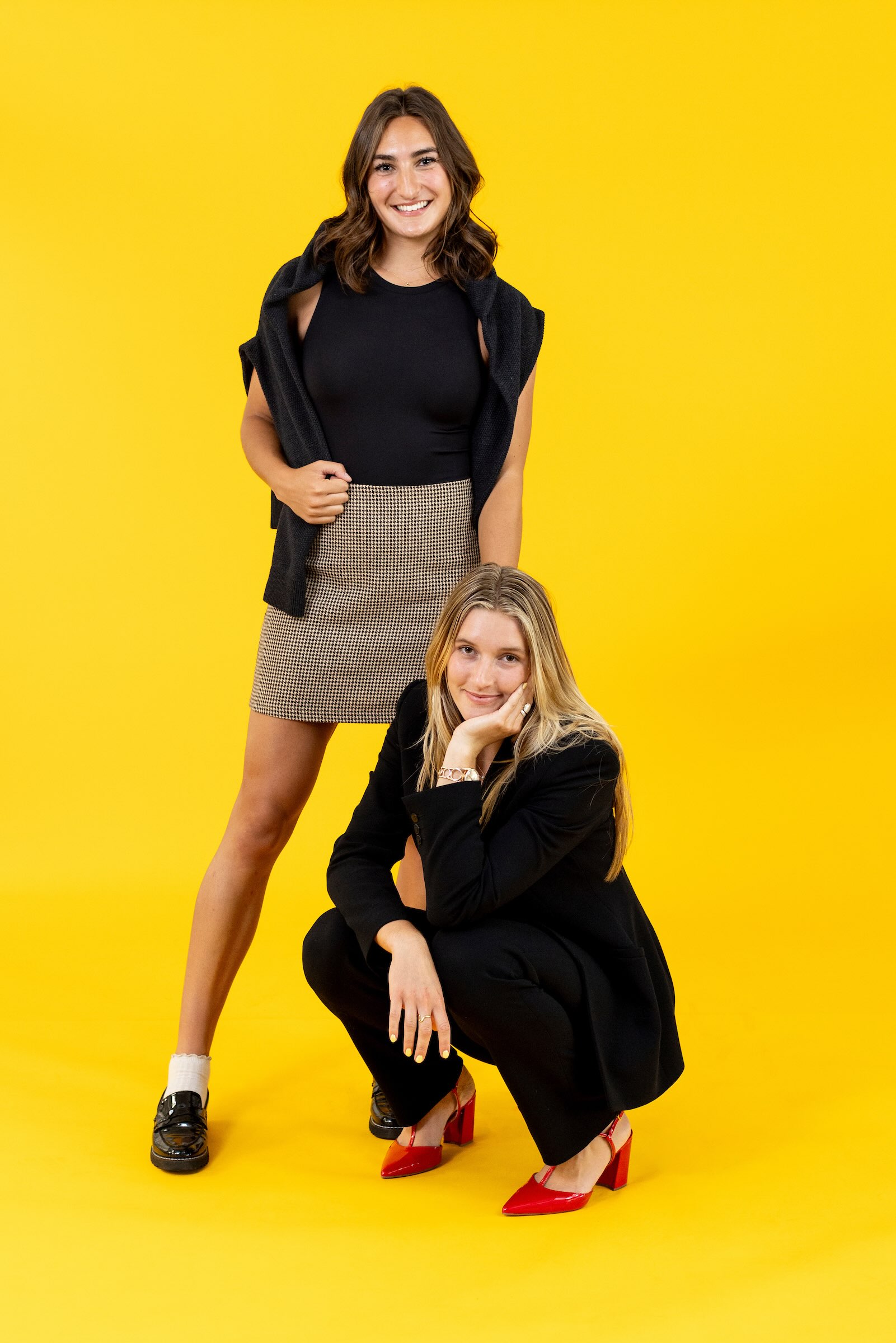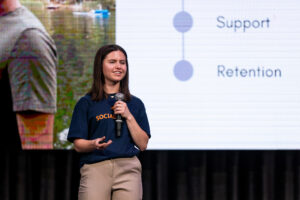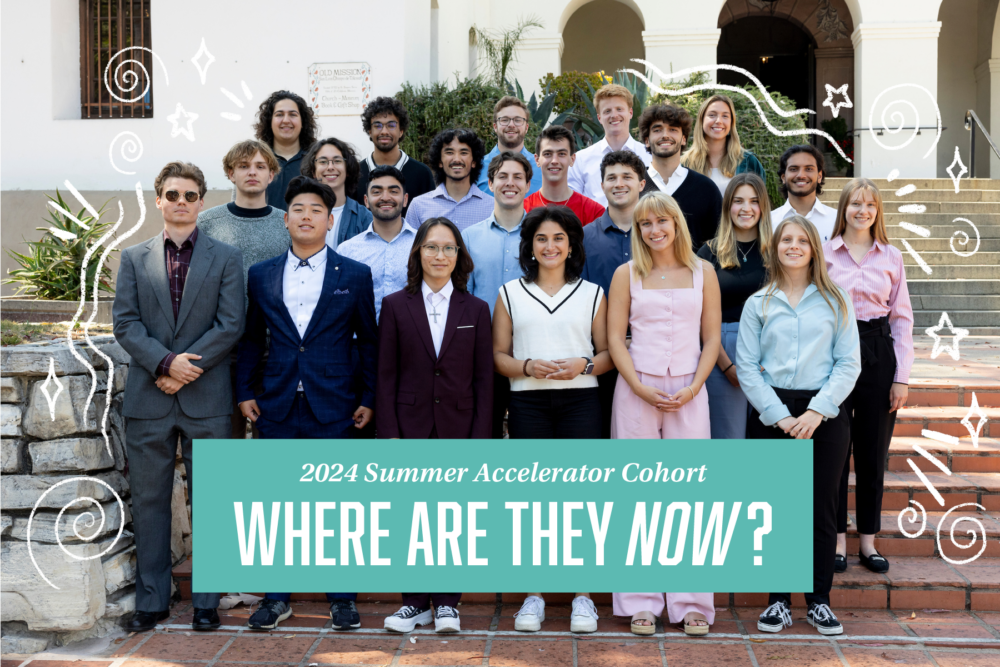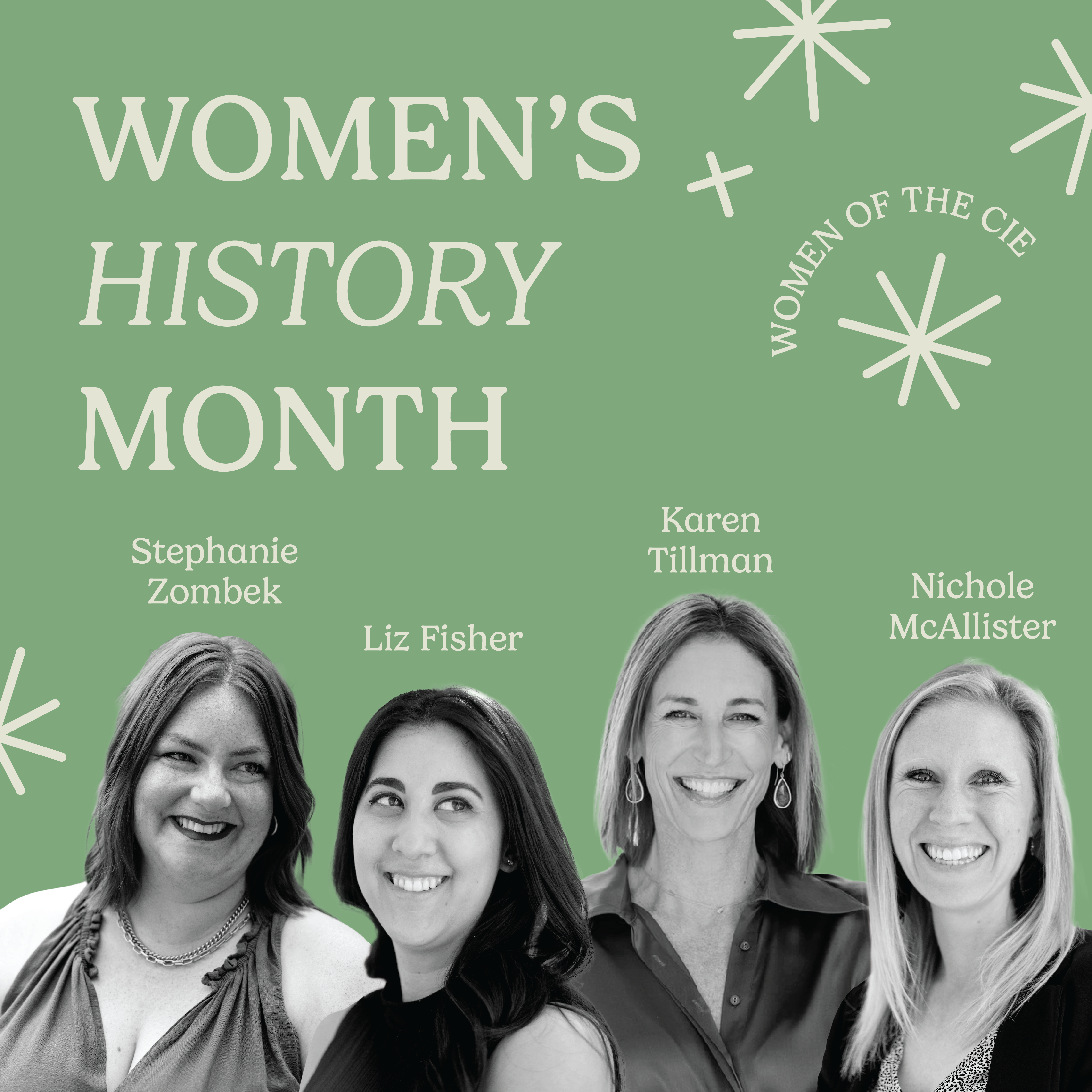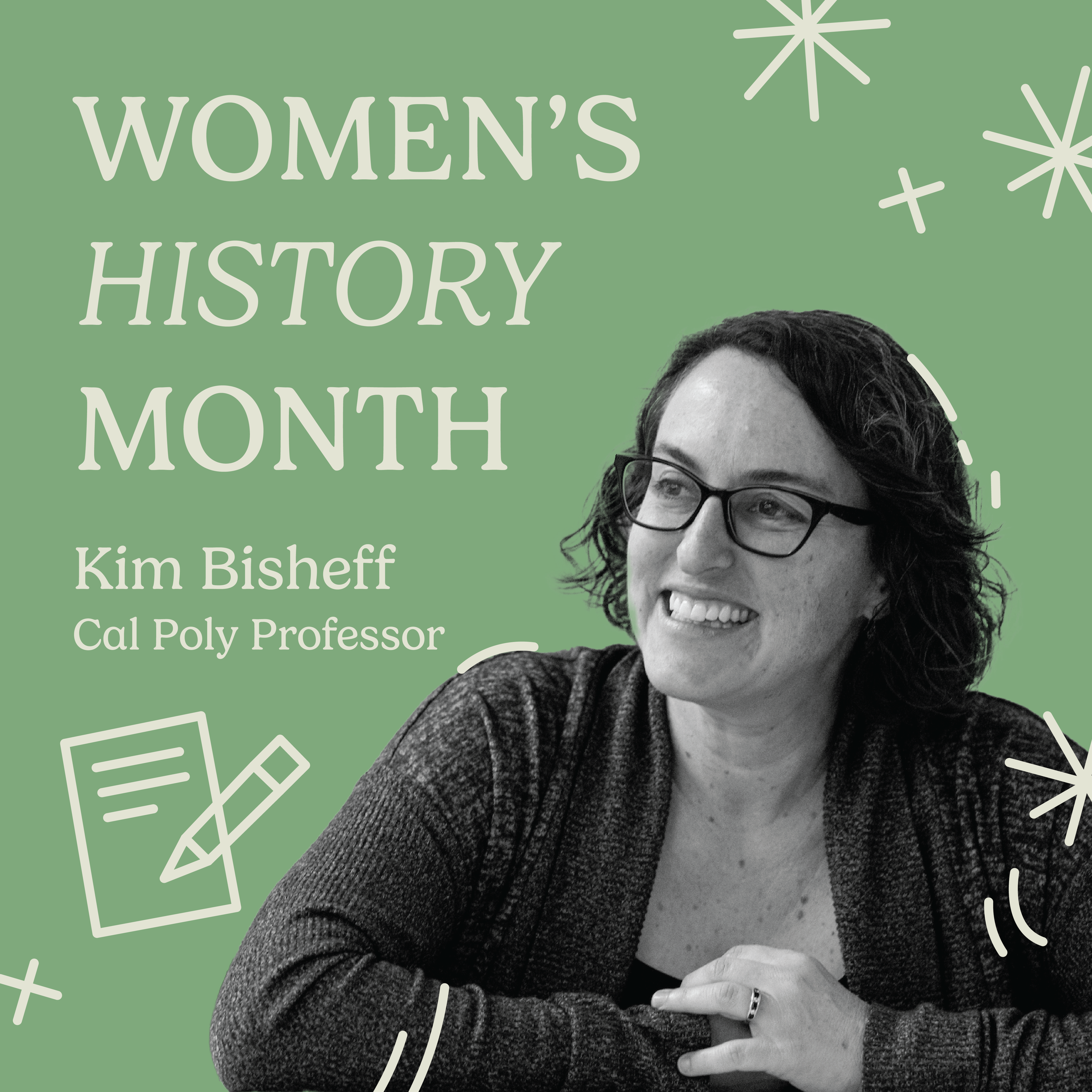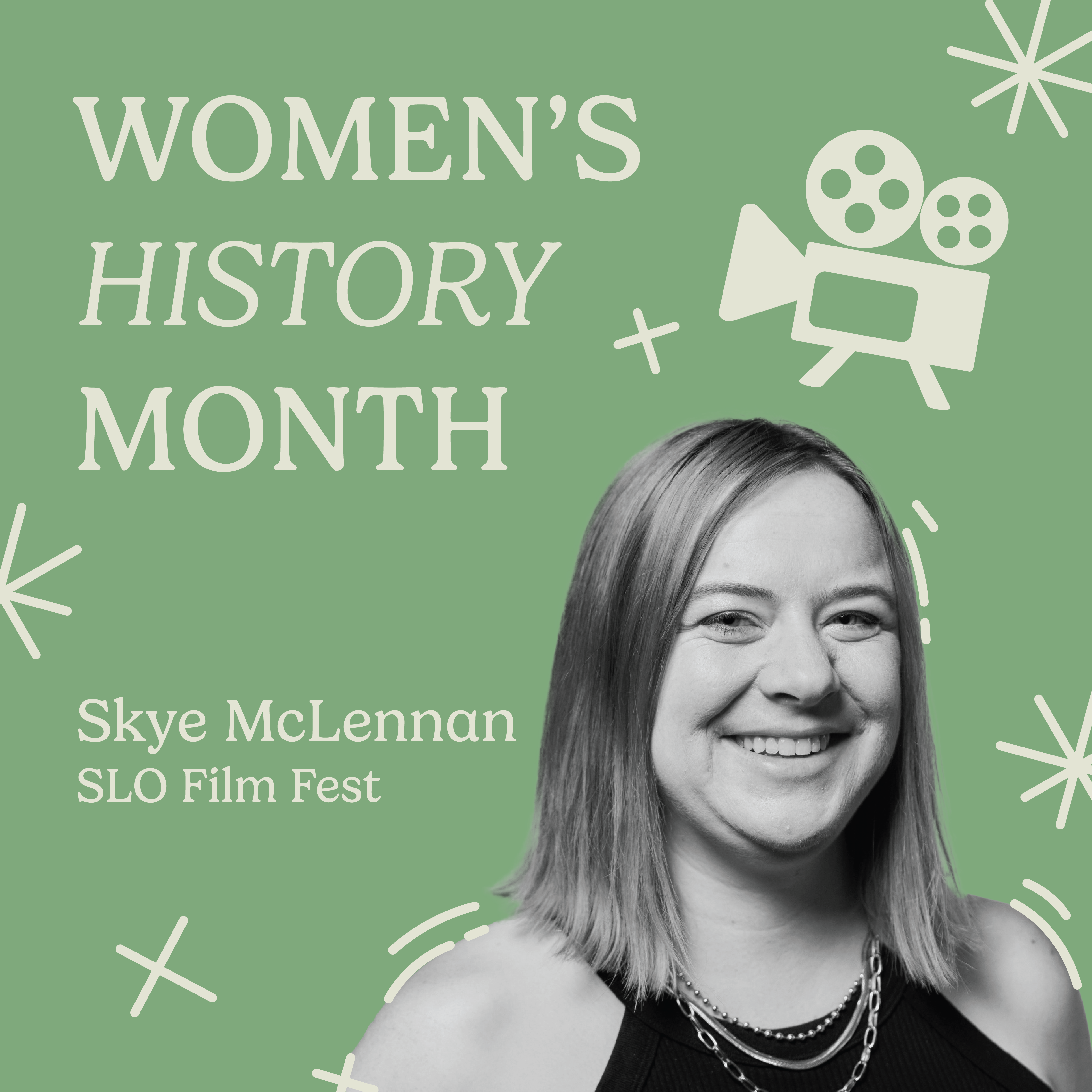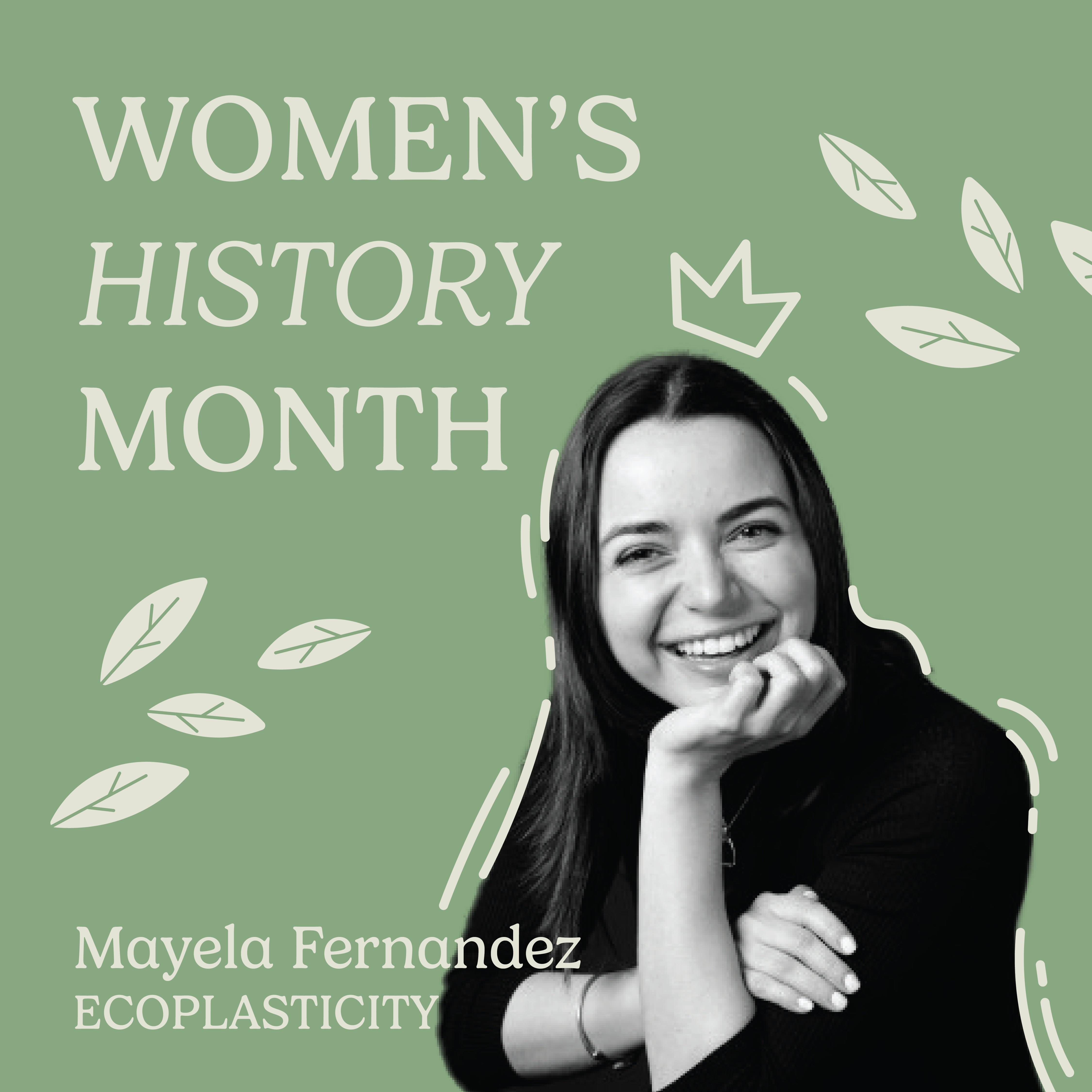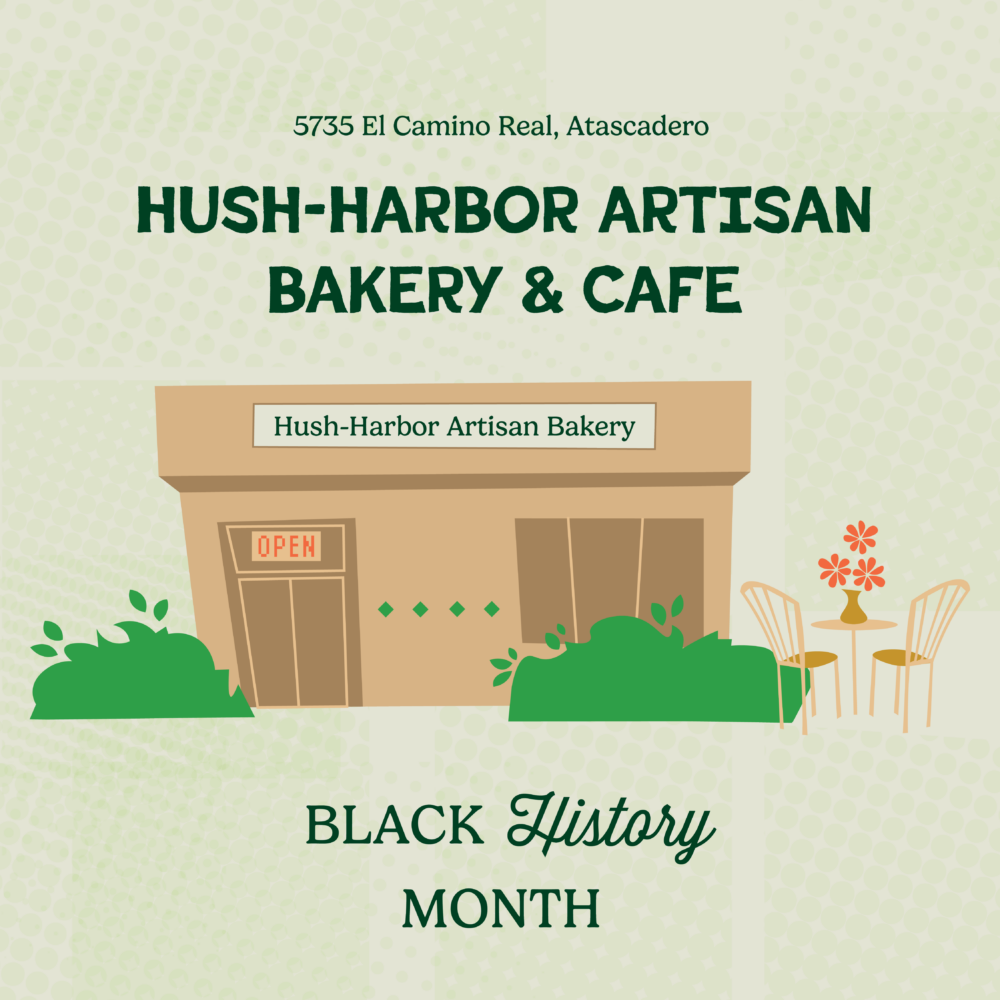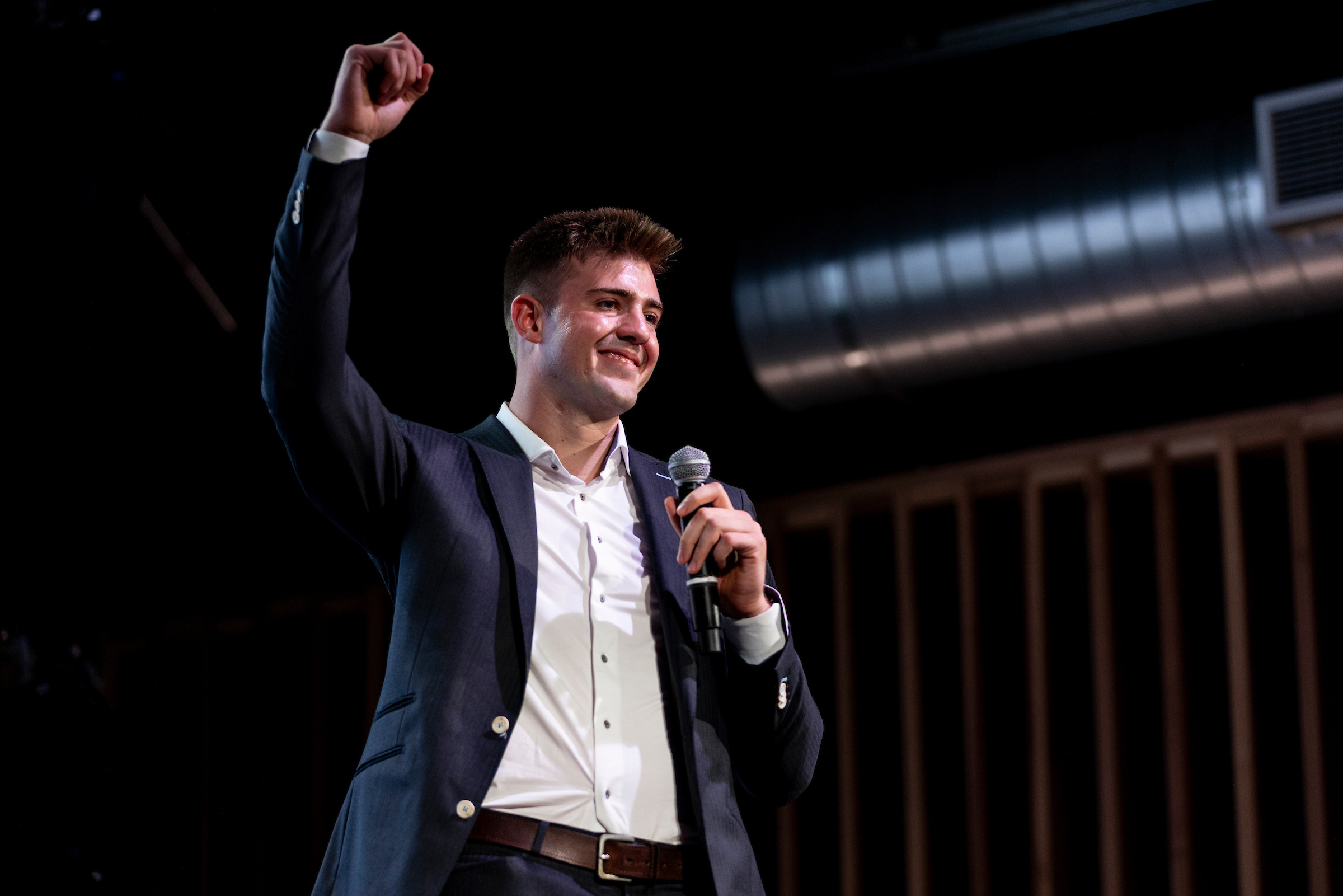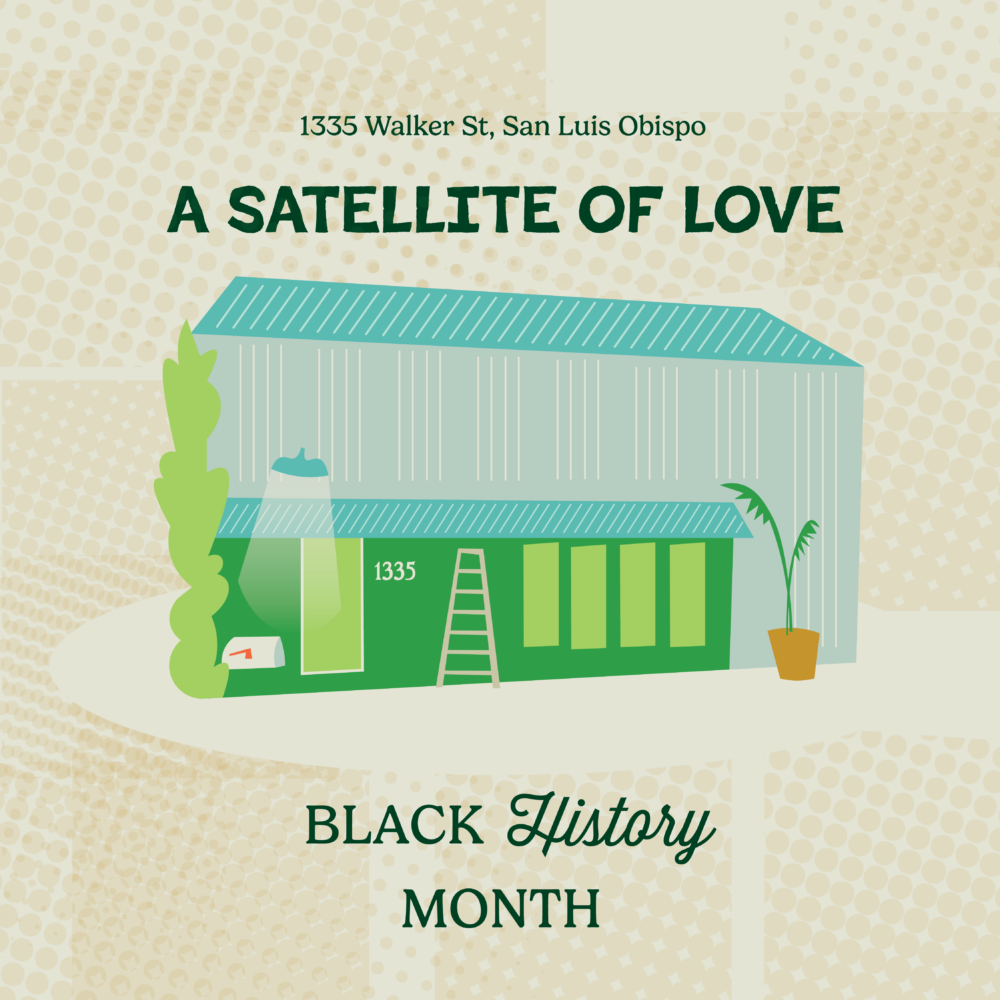It’s been over six months since the 2024 Cal Poly Center for Innovation and Entrepreneurship (CIE) Summer Accelerator wrapped up. Throughout the 12-week program, Cal Poly students and recent grads dedicated their summer to building out their business ideas, gaining hands-on experience and turning early-stage startups into tangible ventures.
The program concluded with Demo Day, where each team took the stage to pitch their startup and share the progress they made over the summer.
Now, months later, the 2024 Accelerator teams have taken the momentum they built and channeled it into exciting new paths—whether that’s launching full-time startups, continuing their education or pursuing new opportunities in the entrepreneurial world.
Here’s a look at where each team is now:
ODIN
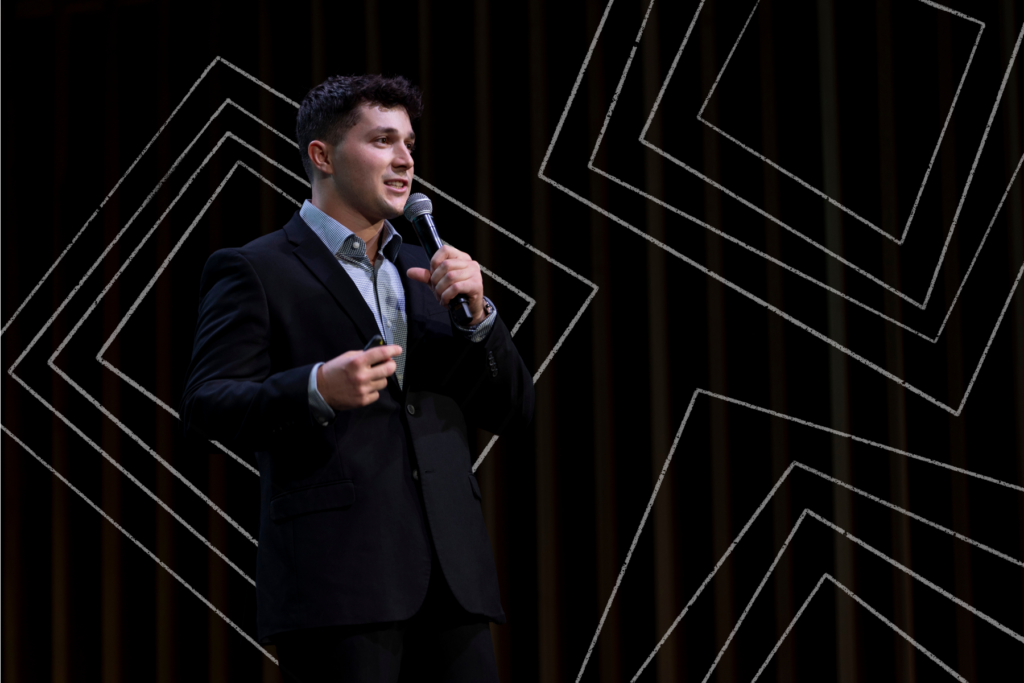
Connor Heffler, CEO and co-founder of ODIN, first got involved with the CIE through Innovation Quest, a high-stakes competition where Cal Poly students pitch their business ideas for the chance to win funding.
ODIN, a startup developing sideline-ready headsets for fast and objective concussion assessments, took home the first-place prize and $15,000. That win launched the team into the Accelerator, where they spent 12 weeks building momentum and refining their vision.
Throughout the course of the Accelerator, Heffler and his team sharpened their focus. “We narrowed in on the problem and started really discovering what the customer’s true problems were in our space,” Heffler said.
He credits the Accelerator not only with helping ODIN evolve, but also with helping him grow as a founder. Connecting with experienced entrepreneurs and executives through office hours and mentorship opportunities gave him invaluable insight. “I personally grew by talking to all the Entrepreneurs in Residence and seasoned entrepreneurs who had already done what we were doing,” he said. “That hands-on experience and guidance was huge.”
The Accelerator also shaped ODIN’s team dynamic and work ethic. “Our team was big on momentum,” Heffler said. “We would always celebrate the little successes, even if they were really small, to propel things forward.”
By the time Demo Day rolled around, Heffler felt ready—and excited—to showcase ODIN’s progress and share a mission that’s deeply personal to him as a former football player who has seen firsthand the impact of concussions.
“Pitching in front of all of those people was unlike anything I’d ever done before, but I was just excited because it’s something I am extremely passionate about. It hits close to home for me,” he said.
His pitch skills had significantly improved over the summer, which he credited to the consistent feedback he received. “Night and day difference,” Heffler said.
Since the Accelerator, ODIN has continued to make significant strides. The team completed their minimum viable product (MVP) within three months, filed a provisional patent, accumulated 8 letters of intent from high schools across the state and won the People’s Choice Award at the Pacific Coast Business Times Innovation Awards event.
Now part of the CIE Incubator, ODIN continues to grow with long-term support. “[The Incubator] feels like a continuation of the Accelerator, but you get a wider net of resources and specific advisors in your space,” Heffler said.
MindSprout
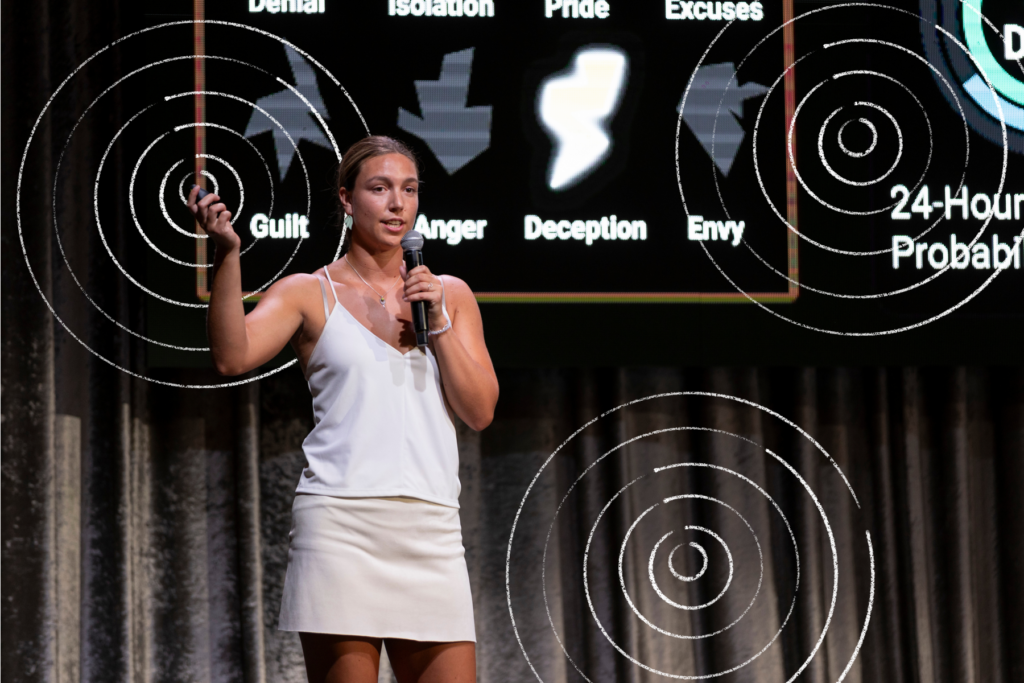
MindSprout is on a mission to help individuals struggling with gambling addiction replace destructive habits with healthier ones. Through a gamified mobile app, the startup aims to provide daily accountability and accessible support right at users’ fingertips.
Before the Accelerator, MindSprout competed in Innovation Quest and took home second place and a $10,000 prize.
“Competing in Innovation Quest really validated our vision that this problem is real and people are invested in it,” said founder Diana Koralski. That validation encouraged her to apply for the Accelerator, where MindSprout would continue to evolve.
“The Accelerator provided incredible mentorship,” Koralski said. “We got assigned two awesome mentors, Jonathan York and Antonio Sylvia. Jonathan really helped us put together a business plan and determine how we’re gonna grow beyond just having a good idea. Antonio was really good with the technical stuff and could tell us a lot more about how to grow an app, how to get it out there on the marketplace, and what a natural growth would look like.”
Alongside mentorship, Koralski appreciated the community aspect of the program. “The Accelerator was really beneficial to meet like-minded people and draw ideas from them and get feedback from them because you’re all trying to figure it out together.”
By Demo Day, Koralski had developed a refined pitch, shaped by the feedback she’d received throughout both Innovation Quest and the Accelerator. “I was really nervous doing it, but there was not a doubt in my mind that it was something I could or couldn’t do,” she said. “It was something that I was going to do, even scared, but it happened and it was so rewarding.”
Just after the Accelerator ended, Koralski took on full leadership of the company. After parting ways professionally with her original co-founder, she committed to carrying MindSprout forward on her own.
Since Demo Day, MindSprout has continued to grow. The team ran its first beta test and received insightful feedback, which prompted a full redesign of the app’s core features.
“We’re focusing on urge surfing,” Koralski said. “The game aims to replicate the dopamine spike of gambling in a safer environment without monetary loss and also offers immediate support alongside long-term behavior change through tools like habit tracking.”
She also shared that the app is now fully embracing gamification, moving beyond just including gamified elements. With a new team of interns, each working on different concepts, MindSprout is working to create a full mind-body gameplay experience that connects progress in the app with real-life personal development.
Koralski also recently connected with the founder of their primary competitor app, who has provided additional mentorship and guidance.
Reflecting on the journey, Koralski says the Accelerator gave her the confidence and mindset she needed to keep moving forward. “The Accelerator prepared me to stay curious and keep asking questions without judgment,” she said. “Being in that supportive community made me realize that people want you to succeed.”
Skymark Systems
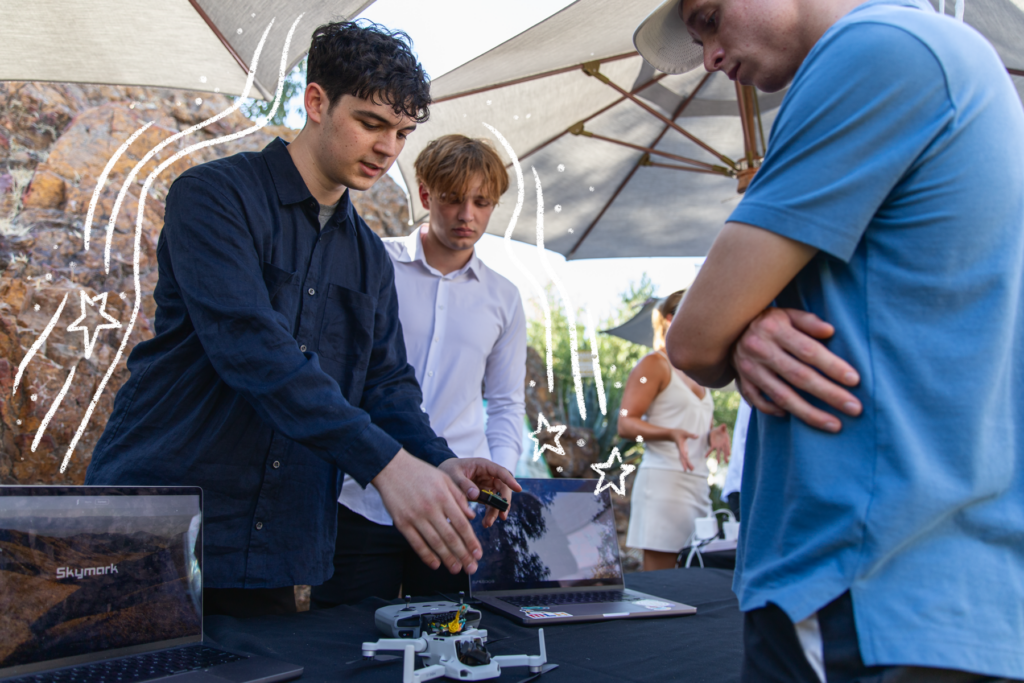
Skymark Systems is tackling a critical issue in modern warfare: helping soldiers distinguish between friendly and enemy drones. The startup is developing a handheld device that uses advanced radio frequency technology and military-grade encryption to identify small and medium-sized drones in real time—a game-changing tool for frontline defense.
The idea for the company emerged from co-founders Oleksandr Gorpynich and Matan Kedar’s personal connections to the conflicts in their home countries. “We looked into the wars in both of our homes and discovered that soldiers often can’t identify drones,” Kedar explained. “We believed we could engineer something to fix this.”
When Skymark entered the Accelerator, the team was heavily focused on the technical side of their product. However, through the program, they learned to shift their perspective. “The Accelerator taught us how to focus on the business aspect of everything,” Gorpynich said. “At first, we were focused on building the technology itself. By the end, we were more focused on identifying a real market for it.”
That shift in mindset proved to be one of the biggest takeaways from the experience. “When trying out any idea, the first step should be to research your market and figure out if this is something that people actually need,” Gorpynich said.
The team also saw major improvements in their pitch delivery over the course of the Accelerator. By Demo Day, their confidence and clarity had grown, helping them communicate the value of their idea more effectively to a broader audience.
Since completing the Accelerator, Gorpynich has returned to Cal Poly to finish his undergraduate degree and resume his internship at Amazon. For his senior project, he’s diving deeper into drone technology, with the goal of gaining more hands-on experience to support a future return to Skymark Systems after graduation.
“I found a professor I really like who does cybersecurity at Cal Poly, so I decided to do my senior project with him,” he said. “Right now, I want to improve my technical skills, and maybe after graduation, focus again on the business side.”
Although the team discovered that the commercial drone defense market isn’t quite there yet, they’re confident that it will be in the near future. “In the meantime, what we’re doing is coming up with a few potential problems, a few potential solutions, and exploring them as more of a tech-related senior project,” Gorpynich said.
The impact of the Accelerator continues to shape his approach. “It taught me what to look out for when doing market research,” Gorpynich said. He’s even shared what he learned with his professional contacts in Ukraine, hoping to make a difference with the knowledge he’s gained.
SafePlate Technologies

SafePlate Technologies is working to revolutionize contaminant detection in the food manufacturing industry by streamlining testing and data management with innovative biosensor technology. Their device uses electrochemical aptamer-based sensors (EABs) to identify food contaminants, essentially taking advantage of the unique shape of each contaminant and capturing them with synthetic DNA strands.
The team behind SafePlate began working together during a senior project led by Dr. Thomas Katona, the CIE Academic Programs Director. With a shared passion for improving food safety, the four founders immediately clicked and began developing their solution.
After competing in Innovation Quest, the team decided to apply for the Accelerator. “The Accelerator gave us a better chance to spend more time on the business side and actually flush things out,” said Dann. “We also had to change the technology.”
Working alongside other student founders added another layer of support. “Getting to talk to the other teams and help each other out was one of the best parts,” Dann said.
For Dann, the biggest lesson was the reality check that startups are tough—progress isn’t always fast, and success isn’t guaranteed. “The work will always be hard and it requires a lot of drive,” he said. However, Demo Day reminded the team how far they had come.
“Even though I was a bit nervous, I was just excited to share everything we’ve been working on. It was a great experience and we got in touch with great people.”
He credits the Accelerator for helping refine their pitch from something that “sounded like a school project” to one that represented a “legit startup.” “I’m super grateful for all the CIE and SBDC programs we’ve been in. They helped us go from a senior project to being a legitimate business, and they put us in a really good place after only three months,” he said.
Since the Accelerator, SafePlate has made significant strides: their technology is functional and moving into the next phase of testing, where they’ve been able to assess key factors like reusability, longevity and sensitivity. They’ve also spoken with representatives from two of the largest food safety companies in the industry, who expressed openness to potential funding or future acquisition. SafePlate recently secured $40,000 in a friends and family round and has officially formed an advisory board to support their continued growth.
Now part of the Incubator program, the team is continuing to build on the momentum from the Accelerator. “The Accelerator set the expectation for the number of hours we’d work and how many different things we’d be doing at once,” said Dann. “It showed how time-consuming it can be, but also how flexible and fun it is to work with people you like on something no one’s ever done before.”
GreenSight Technologies
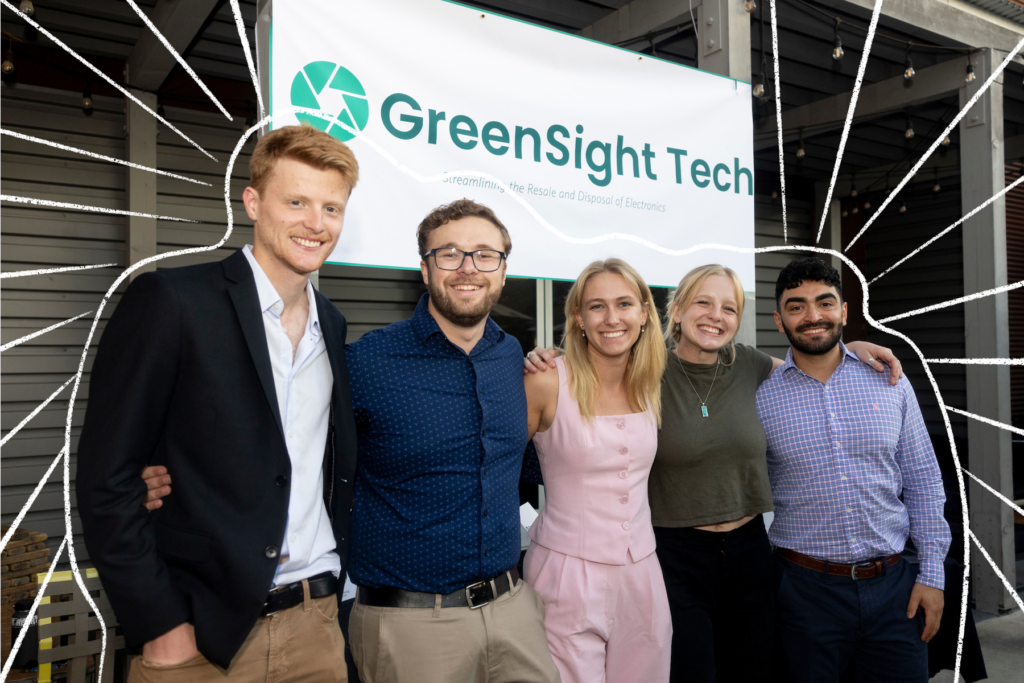
GreenSight Technologies is tackling the growing issue of electronic waste by promoting a circular economy for used electronics. Their AI-powered platform helps refurbishers and resellers identify, evaluate, and resell devices more efficiently, keeping electronics out of landfills and making technology more accessible to all.
The idea for GreenSight Tech was born in the entrepreneurial senior project class, led by Dr. Thomas Katona. While exploring potential focus areas, the team discovered the staggering scale of electronic waste and set out to develop a tech-forward solution.
Up until the Summer Accelerator, GreenSight Tech was still structured like a school project, but the Accelerator helped them make the leap to a legitimate business. “It propelled us forward with our product development,” Daniels said. “It also connected us with incredible resources and introduced us to advisors and like-minded entrepreneurs. That helped us shift out of the school mindset and into a space where we could really thrive.”
One of their biggest challenges was explaining the niche problem they were solving, as not everyone is familiar with what happens to old electronics. “It took us the whole summer to figure out how to explain what these companies do and the problem they’re facing,” Daniels said. “But by the end of the program, we could explain it clearly enough that our pitch actually made sense.”
That clarity came just in time for Demo Day. “It was an incredible platform for us,” Daniels said. “Pitching was thrilling. It was hard to fit all we’d done into a few minutes, but it was the perfect way to wrap up a really fun and productive summer.”
Since the Accelerator, GreenSight Tech has incorporated as a company, completed the final version of their mobile app, and is preparing for beta testing in April with four electronics recycling and refurbishment companies. The app enables technicians to snap a photo of a device, automatically identify it and receive a value estimate—helping them decide whether to recycle or resell. The team also raised initial funding and is preparing to scale the platform across more companies in the industry.
Reflecting on his Accelerator experience, Daniels said it gave him essential insight into what it takes to run a startup. “You just have to throw yourself out there and do it,” he said. “If you’re thinking about doing something like the Accelerator, you’ll never know if it’s the right fit—but you have to be willing to take that risk to find out. I was on the fence at first, but I followed my gut, and I don’t regret it at all.”
ONGAWA
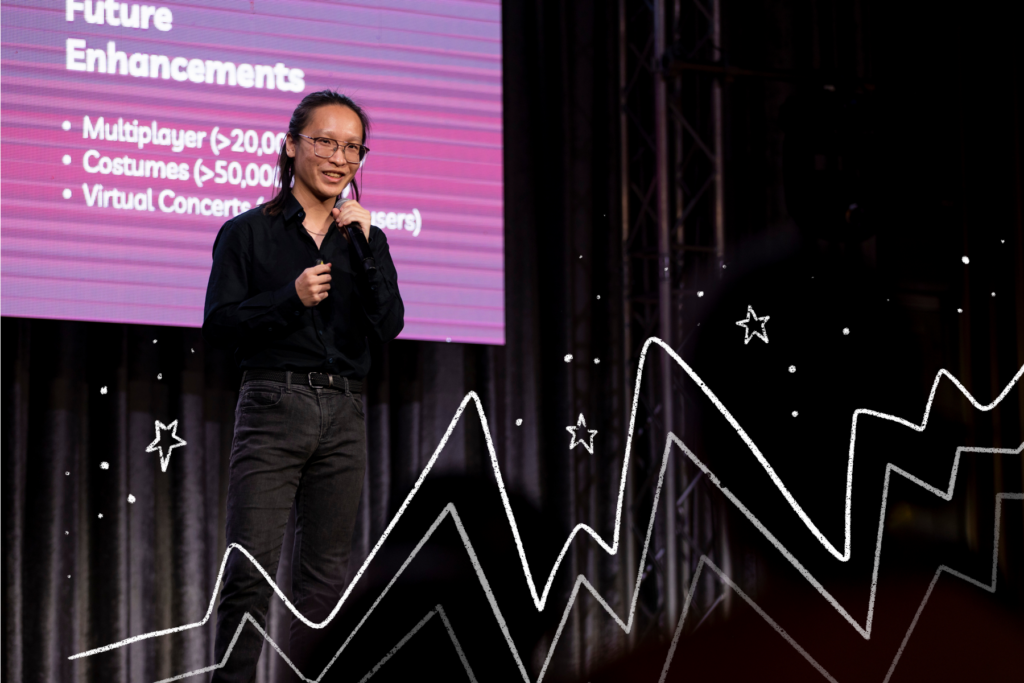
For Lucas Li, ONGAWA is more than just a startup — it’s a passion project rooted in his love for music, gaming and anime.
“I am a gamer, a musician and an anime lover, so I wanted to create something that I would really enjoy working on,” said Li, a recent computer science master’s graduate from Cal Poly.
Li is the founder and CEO of ONGAWA, a gaming software startup that fuses rhythm-based gameplay with role-playing elements. Beyond offering a one-of-a-kind gaming experience, ONGAWA supports independent musicians by showcasing and monetizing their work through the platform.
Li first pitched ONGAWA publicly at the CIE’s Elevator Pitch Competition in Fall 2023. The experience, he said, helped him learn how to speak about his product in a way that resonated beyond the technical details.
“Since the Elevator Pitch was my first exposure to business, I learned to convey my idea in simple terms and quickly capture people’s interest,” Li said. That experience encouraged him to apply for the Accelerator.
“Before the summer, we were just thinking about product development as a programmer, as a coder, and that’s it,” Li said. “During the Accelerator, we started to think more about the business perspective, like customer development, product market fit, and all of those sorts of things.”
Throughout the Accelerator, the ONGAWA team learned how to tailor their message for broader audiences and gained a better understanding of their market. Li said Demo Day was one of the most memorable experiences of the summer.
“Demo Day felt like an actual conversation,” he said. “I was looking at what’s happening on the audience’s face, trying to read through their impression and decide how I want to say my next sentence.”
Since the Accelerator, ONGAWA has continued to make strong progress. The team, which has grown to 15–20 members, is now running quarterly play tests to gather feedback and improve the product. Each play test involves 15 to 25 participants and focuses on a specific aspect of the game’s design or functionality. They’ve also collaborated with KCPR, Cal Poly’s student-run radio station, and have begun integrating a variety of new music genres into the game. In addition to building new environments and characters, they’ve significantly expanded their game assets—setting the stage for continued growth.
Everest Medical
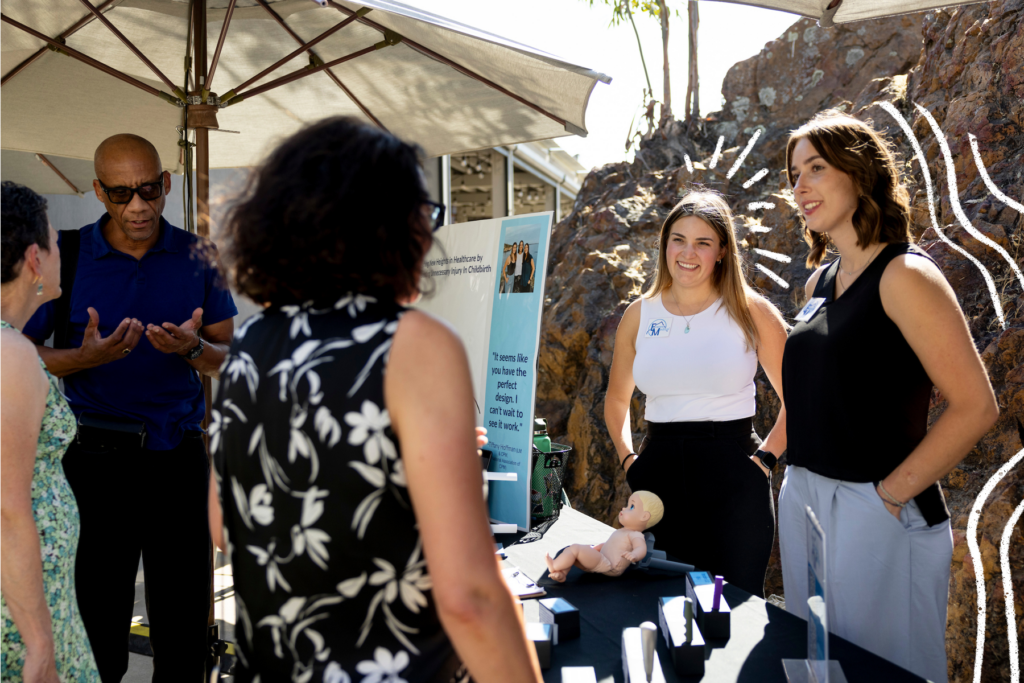
Shoulder dystocia occurs when a baby’s shoulder gets stuck behind the mother’s pelvic bone during delivery, often resulting in serious complications such as clavicle fractures or nerve damage. Everest Medical is developing a handheld device designed to assist in these situations. The device gently wraps around the baby’s upper body, helping safely guide the infant out while working with the mother’s anatomy.
The startup joined the Accelerator in hopes of building their business. “Going into the Accelerator, we had an idea of what we thought a business could be, but we mainly had a solution to the problem and none of the structure to create a business around it,” Eissmann said. “As the Accelerator progressed, our team and concept developed and we really understood that outside of having an idea, there are all these other structures you need to put in place to develop a business.”
Throughout the summer, Eissmann found herself not only learning business fundamentals, but also growing personally even while facing physical challenges. “Having a broken foot at the same time was interesting too,” she said. “It was a little bit of exposure therapy for building confidence despite anything that’s going on, and still moving forward.”
From improving her public speaking to learning how to communicate her startup’s mission, Eissmann said the Accelerator helped her gain a new sense of confidence and professionalism.
“The pitch practice helped my public speaking skills and now I feel really confident anytime I have to go up and do some sort of presentation,” she said. “The Accelerator really improved my professionalism as well as my confidence in my abilities and in myself.”
The experience also pushed her out of her comfort zone. “The Accelerator really embodies being willing to learn and being willing to not know everything, because that’s when you find the best opportunity for improvement,” she said.
Since Demo Day, Eissmann and her team have continued building their business. The startup has competed in several pitch competitions, advancing to the semifinals or finals, and completed its first round of validation testing—proving the mechanics of the device and confirming its viability. Everest Medical also conducted ergonomic evaluations with two different OB-GYNs to get feedback on how the device could be improved for real-world use.
In addition, the team won the Tom Leben’s Patent Award through the Accelerator and has been working closely with Leben to prepare their materials to file a provisional patent. They’ve officially incorporated as a company and are actively seeking funding to help bring their device to market.
“I would not be able to run a business without the Accelerator,” Eissmann said. “The amount of information we learned in just those 12 weeks is more practical than a lot of what I had learned through my entire education.”
Eissmann is currently finishing her master’s degree in engineering management and recently completed her master’s project. In April, Everest Medical will join the Incubator program, where Eissmann hopes to keep the progress going.
“I’m really excited to start the Incubator because it’ll really help launch us forward which is what we need in terms of funding, specifically,” she said.
For Eissmann, the Accelerator not only gave her the tools to build a business; it taught her how to understand the world of innovation, intellectual property and entrepreneurship in a deeply practical way.
“Without the Accelerator, I would not have the understanding of patent law that I do now,” she said. “That’s a really valuable skill in my field because that’s where a lot of innovation lies.”
NeuroCom
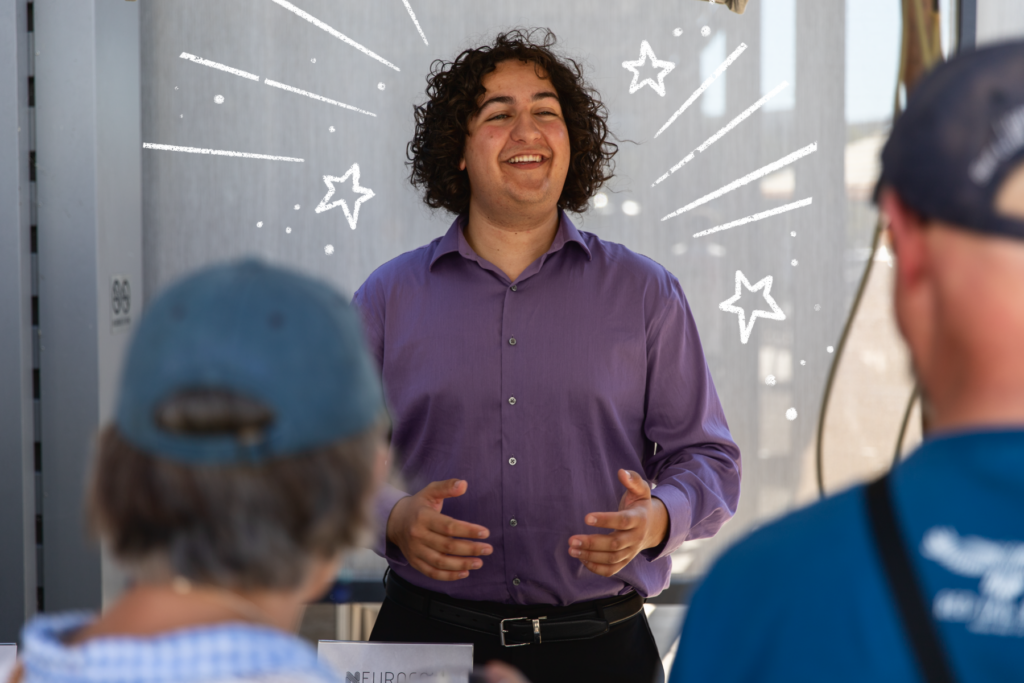
NeuroCom is creating a wearable tactile interface designed to improve communication and situational awareness for first responders and military personnel. The device operates through sensory substitution, a technique that enhances one sense by replacing or augmenting it with another. In this case, NeuroCom’s product uses tactile and haptic feedback to convey location information—making it the first of its kind in this specialized field.
NeuroCom’s product is designed for use by military personnel, law enforcement officers, and firefighters, helping them better understand their surroundings even when traditional visual or auditory cues aren’t sufficient.
Solo-founder Alex Rosenbaum has participated in multiple events at the CIE, from the Biomedical Make-a-Thon (where he won twice) and the iQ competition to the Accelerator program.
Rosenbaum found the Accelerator to be transformative for his startup, especially in refining his approach to targeting the right customers. “The Accelerator helped us gain clarity about who we need to sell to, as opposed to just who the product is going to be used by,” he said. “We were pushed to talk to more of the stakeholders, not just the end users, which is especially important when you’re selling to the state or government.”
Rosenbaum’s journey to Demo Day also marked a significant shift in how he pitches his business. “The main shift between my first pitch and Demo Day is that it was less of an engineering presentation and more of a business pitch, so there was a lot less focus on the technical aspects and more of creating a story around the product and the vision for what the company will become.”
Since completing the Accelerator, Rosenbaum has expanded his team, bringing on software engineers and looking to recruit computer engineers and electrical engineers. This expansion comes as he gathers more feedback from industry stakeholders about where NeuroCom’s product will be most impactful. “We’ve doubled or tripled the amount of people we’ve talked to with relevant experience in the space,” Rosenbaum said. “We’re forming a better picture of how our product fits into the strategic vision of search and rescue, fire, and military.”
Rosenbaum has also attended several key conferences, including the Joint Interagency Field Exchange Program, and is working on setting up product tests with various armed forces teams and offices. This ongoing feedback is crucial as Rosenbaum is currently in the phase of testing the market and refining the product across different industries.
“The Accelerator helped me run my business when it comes to the long-term vision and planning through milestones instead of planning to milestones,” Rosenbaum said. With his product gaining traction and industry interest, Rosenbaum is now looking to expand his team further. “We’re looking for talented electrical engineers, computer engineers, mechanical engineers and firmware engineers to join the team.”
###
